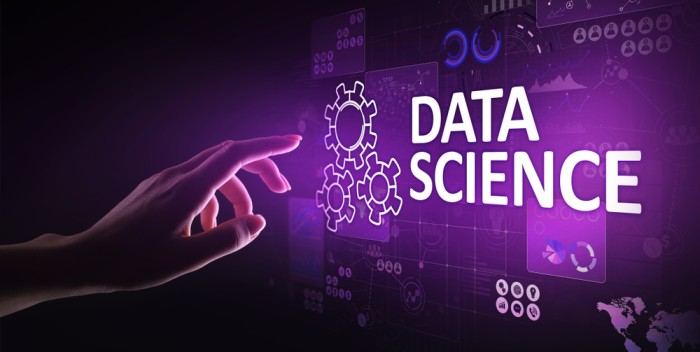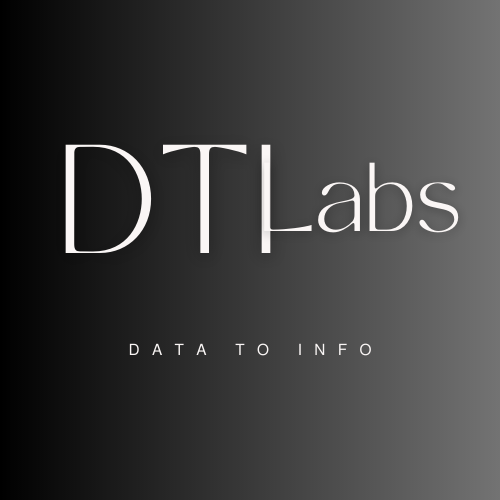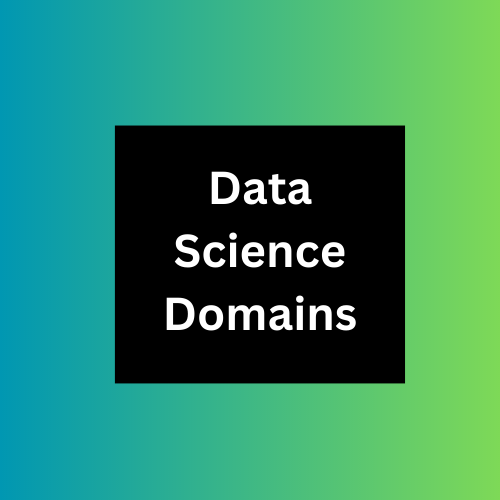Data science has emerged as one of the most sought-after career paths in recent years, with organizations across various industries recognizing the value of data-driven decision-making. If you are considering starting a career in data science, it is essential to familiarize yourself with the diverse domains that exist within this field. This article will explore ten key domains that aspiring data scientists should be aware of as they embark on their professional journey.

What is Data Science ?
Data science is an interdisciplinary field that combines scientific methods, algorithms, and systems to extract knowledge and insights from structured and unstructured data. It involves the application of statistical analysis, machine learning techniques, and data visualization to solve complex problems and make data-driven decisions. Data scientists work with vast amounts of data from various sources, including databases, sensors, social media, and the internet, to uncover patterns, trends, and correlations that can inform business strategies, scientific research, and other domains.
At its core, data science encompasses three key elements: data preparation, data analysis, and data interpretation. Data preparation involves collecting, cleaning, and organizing raw data, ensuring its quality and relevance for analysis. Data analysis employs statistical techniques, machine learning algorithms, and exploratory data analysis to identify patterns, relationships, and anomalies within the data. Finally, data interpretation involves drawing meaningful insights from the analysis and effectively communicating those insights to stakeholders.
Data science finds applications in a wide range of fields, including finance, healthcare, marketing, social sciences, and technology. It plays a vital role in enabling organizations to uncover hidden trends, predict future outcomes, optimize processes, and make informed decisions. From developing recommendation systems for personalized user experiences to predicting customer behavior and optimizing supply chain operations, data science has become an integral part of modern businesses and industries.
To excel in data science, professionals require a diverse skill set. Proficiency in programming languages like Python or R, knowledge of statistical concepts and methodologies, familiarity with machine learning algorithms, and expertise in data visualization tools are essential. Additionally, strong problem-solving abilities, critical thinking, and a curious mindset are valuable traits for data scientists.
- Machine Learning: Machine learning is at the core of data science. It involves developing algorithms and statistical models that enable computer systems to learn from data and make predictions or take actions without explicit programming. Understanding machine learning techniques, such as regression, classification, and clustering, is crucial for any data scientist.
- Statistical Analysis: Statistics forms the foundation of data science. Proficiency in statistical analysis is vital for designing experiments, drawing meaningful conclusions from data, and making informed decisions. Concepts like hypothesis testing, sampling, and statistical modeling are essential tools in a data scientist’s toolkit.
- Data Visualization: Data visualization is the art of presenting complex data in a visually appealing and easily understandable manner. Effective visualization techniques help data scientists communicate insights to stakeholders and make data-driven decisions. Skills in using visualization libraries and tools like Tableau, D3.js, or Python’s Matplotlib are highly valuable.
- Big Data: The exponential growth of data in today’s world has led to the need for managing and analyzing massive datasets known as big data. Familiarity with distributed computing frameworks like Hadoop and Spark, along with skills in handling unstructured data, data preprocessing, and parallel computing, are essential in this domain.
- Natural Language Processing (NLP): NLP focuses on enabling computers to understand, interpret, and generate human language. As an emerging field within data science, NLP is essential for tasks such as sentiment analysis, language translation, and chatbot development. Proficiency in techniques like text mining, information retrieval, and language modeling is valuable for NLP applications.
- Time Series Analysis: Time series analysis deals with data points indexed in chronological order. It is widely used in various domains, including finance, forecasting, and signal processing. A data scientist with expertise in time series analysis can identify patterns, trends, and anomalies, enabling accurate predictions and informed decision-making.
- Data Engineering: Data engineering involves the extraction, transformation, and loading (ETL) of data into suitable formats for analysis. Data scientists should have a foundational understanding of data engineering concepts, databases, data pipelines, and data integration techniques. Proficiency in programming languages like SQL, Python, or Scala is crucial for effective data manipulation.
- Domain Knowledge: While technical skills are vital, having domain knowledge in a specific industry can greatly enhance a data scientist’s effectiveness. Understanding the business context, industry-specific challenges, and relevant data sources allows data scientists to extract actionable insights that drive value for the organization.
- Experimental Design: Experimental design is crucial for conducting rigorous experiments to validate hypotheses and optimize processes. Understanding concepts like control groups, sample size determination, and randomization helps data scientists design experiments that yield reliable and unbiased results, leading to more robust conclusions.
- Ethical Considerations: Data scientists work with sensitive data that can impact individuals and society as a whole. Understanding the ethical implications of data collection, data usage, and algorithmic decision-making is essential. Data scientists should be aware of privacy regulations, bias mitigation techniques, and the responsible use of data to ensure ethical and fair outcomes.
Also check out Data Science roadmap below.
Link: Data Science
Conclusion
Embarking on a career in data science opens up a world of possibilities. By familiarizing yourself with these ten domains, you will develop a strong foundation to thrive in this rapidly evolving field.
Please comment down below if you have any queries and do share such interesting stuff with your friends and family.
FAQ
How has data science evolved as a field?
Data science has seen significant growth both in terms of solving business needs and career development. Data scientists have become one of the most essential contributors to any field. Instead of learning the generalized skill set, data scientists are focusing on specific skill sets required for specific fields such as cloud, ML, and deep learning. Even experienced professionals are constantly focusing on learning new skills and sharpening their existing skills. By targeting certain specific fields and skills, more jobs in those specific areas are being created.
What is the difference between data science and data analytics?
Data Science is much of a broader term is a macro topic and data analytics is a part of it. Both of these fields require separate skillsets such as data science requires the professionals to be having the knowledge of data modelling, predictive analytics programming, etc. Whereas the data analytics requires the knowledge of BI tools, SQL, etc. Data Analytics utilize the existing information to unravel new information or insights.
Are data scientists in demand?
The organizations are becoming data driven and so is the requirement of professionals who know how to manage the data effectively. Yes, data science is in a very huge demand, and it comes under one of the high paying field. The market for data science is growing rapidly and is expect to reach USD 25.94 billion by 2026.
What industries need data scientists?
The field of data science is applicable in almost every field today. Some of the fields are mentioned below- E-Commerce Banking Finance Transport IT Education Marketing Sales
How do you venture into data science?
In order to get into data science the following steps can be taken forward- Invest time into learning programming languages Basic mathematics Machine learning concepts Practice Brush up skills
Can I get a job in data science as a fresher?
Yes definitely! There are various opportunities to get a job as a fresher. The freshers can utilize these jobs in order to brush up their skills, gain new skillset and network.

